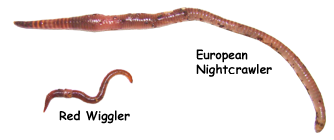Red Wiggler Worms Demystified: Opening the Tricks of Vermiculture for Greener Living and Nutrient-Rich Dirt
In the realm of sustainable techniques for improving dirt high quality and advertising eco-conscious living, red wiggler worms play a pivotal yet usually overlooked role. These humble creatures possess the amazing capability to transform organic waste right into nutrient-rich spreadings that act as a potent all-natural fertilizer. By diving into the globe of vermiculture, one can discover a myriad of advantages that extend much beyond traditional composting approaches. Comprehending the complexities of caring for these worms, maximizing their atmosphere, and harnessing their spreadings can result in a greener way of living and healthier dirt for plants to prosper.
The Duty of Red Wiggler Worms
Red Wiggler worms play an important function in composting systems by successfully breaking down raw material into nutrient-rich castings. These starved eaters consume a range of natural materials, such as kitchen area scraps, lawn waste, and paper items. As they feed, the worms' digestive processes damage down the natural matter right into a penalty, dark, and nutrient-dense product understood as worm spreadings or vermicompost.
The spreadings generated by Red Wiggler worms are highly helpful for dirt health and plant growth. They are rich in necessary nutrients like nitrogen, potassium, and phosphorus, which are crucial for sustaining healthy and balanced plant growth. Additionally, worm castings include useful microorganisms and enzymes that assist enhance soil structure, boost water retention, and improve nutrient uptake by plants.
Benefits of Vermicomposting

Furthermore, vermicompost, the nutrient-rich final result of vermicomposting, acts as an exceptional organic plant food and dirt conditioner. It enhances soil structure, enhances dirt oygenation, and enhances dirt wetness retention. These residential properties contribute to healthier plants with more powerful origin systems and better resistance to conditions and bugs. Vermicompost also improves the soil with crucial nutrients like nitrogen, phosphorus, and potassium, advertising plant development and overall dirt fertility.
Furthermore, vermicomposting supports sustainable gardening methods by supplying a all-natural and chemical-free option to synthetic plant foods. Red Wiggler Worms. This eco-friendly approach not only improves the dirt yet likewise assists minimize reliance on hazardous chemicals, advertising a greener and much more sustainable way of gardening
Establishing Up a Worm Bin
When establishing a worm container for vermicomposting, appropriate setup is critical to guarantee the success of the composting procedure. The very first step in establishing up a worm bin is picking a suitable container.
After including the bed linens, present the red wiggler worms to the container. It is suggested to begin with a little number of worms and gradually boost as they multiply. The worms should then be provided with food scraps such as fruit and vegetable peels, coffee grounds, and eggshells. It is necessary to stay clear of including meat, dairy, oily, or salty foods to stop attracting bugs and producing undesirable smells.
Frequently check the dampness levels and temperature in the worm container to guarantee optimum conditions for the worms. With correct configuration and upkeep, the worm bin will successfully transform natural waste right into nutrient-rich garden compost for your plants and garden.
Gathering Worm Castings
To efficiently collect nutrient-rich worm spreadings from your vermicomposting system, a systematic harvesting technique is essential. When it comes time to harvest the worm castings, there are a couple of vital steps to comply with to ensure an effective process. First of all, stop adding fresh food scraps to one side of the worm container for a number of weeks prior to gathering. This motivates the worms to migrate sideways with fresh bed linen and food, making it less complicated to dig the castings from the various other side.

Troubleshooting Common Issues
Recognizing and attending to common challenges that may emerge during the vermicomposting process is crucial for maintaining a efficient and healthy and balanced worm bin. One typical concern that vermicomposters encounter is overfeeding. Adding excess food scraps can bring about a buildup of wetness and acidity in the worm bin, possibly harming the worms. To avoid this, feed the worms in moderation, guaranteeing that the food scraps are effectively damaged down prior to including much more. Another problem is undesirable odors rising from the worm container. Foul smells suggest anaerobic conditions, usually brought on by overwatering or insufficient air flow. To remedy this, adjust the moisture levels by adding dry bedding products like shredded paper or cardboard and rise aeration by transforming the bed linen regularly.
In addition, if the worm populace is decreasing or the worms appear undesirable, maybe because of environmental stressors such click reference as extreme temperatures or pH degrees. Keeping an eye on these factors and making essential changes is important for the wellness of the worms. By repairing these common problems promptly, vermicomposters can ensure a smooth and effective vermicomposting procedure while maintaining a prospering worm populace.

Conclusion
In final thought, red wiggler worms play an essential function in vermiculture by damaging down organic matter right into nutrient-rich soil. Establishing up a worm bin is important for effective vermiculture, and gathering worm castings offers beneficial garden compost for gardening.
As they feed, the worms' digestive processes damage down the organic matter right into a fine, dark, and nutrient-dense product recognized as worm castings or vermicompost.
The spreadings created by Red Wiggler worms are extremely beneficial for soil wellness and plant growth. Adding excess food scraps can lead to a buildup of wetness and level of acidity in the worm container, potentially damaging the worms.Additionally, if the worm population is decreasing or the worms appear click resources harmful, it might be due to environmental stress factors such as extreme temperatures or pH degrees. Establishing up a worm bin is essential for successful vermiculture, and harvesting worm castings supplies beneficial compost for gardening.